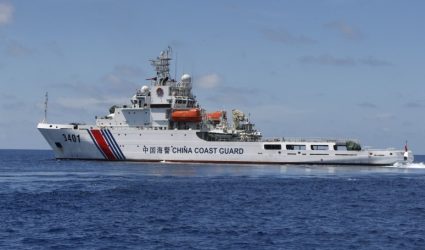China blocking Malaysian and Vietnamese oil and gas vessels ‘shows greater willingness to use force’, think tank says

(SCMP) – Actions at Vanguard Bank in disputed Spratly Islands ‘raises collision risk’. Think tank cites data showing China has harassed those countries’ ships for at least six weeks.
The risk of collisions between Chinese vessels and those from Malaysia and Vietnam in the South China Sea has been heightened in recent weeks as China has tried to obstruct the two countries’ oil and gas exploration, a Washington-based think tank said on Wednesday.
The analysis comes with a stand-off simmering between Chinese and Vietnamese vessels at Vanguard Bank, a reef in the disputed Spratly Islands, risking an escalation of tensions and anti-China protests as it did five years ago.
Beijing has shown it is increasingly willing to use force and threats to block its neighbours’ oil and gas ambitions, said the Asia Maritime Transparency Initiative, which works under the Centre for Strategic and International Studies.
The latest tensions have lasted two weeks, since Chinese survey vessel Haiyang Dizhi 8 sailed across two oil and gas blocks within 200 nautical miles of Vietnam on July 3.
The survey ship was well protected by at least four coastguard vessels, including one of the world’s largest in the 12,000-tonne Haijing 3901, the initiative said, citing ship tracking data. Vietnam has sent coastguard vessels to shadow the Chinese surveying ship.
ARVE Error: src mismatch
provider: youtube
url: https://www.youtube.com/watch?v=8eqtl0ym1p8
src in org: https://www.youtube.com/embed/8eqtl0ym1p8?wmode=transparent&rel=0&feature=oembed
src in mod: https://www.youtube.com/embed/8eqtl0ym1p8?wmode=transparent&rel=0
src gen org: https://www.youtube.com/embed/8eqtl0ym1p8
China, Vietnam and Malaysia have all remained silent about the blockage, but the initiative said China had harassed the two nations’ oil and gas exploration ships for at least six weeks, again citing ship tracking data.
It said Chinese coastguard vessel Haijing 35111 had patrolled around Luconia Breakers, a reef cluster at the southern end of the Spratlys, from May 10 to 27, including an oil and gas block licensed to petroleum company Sarawak Shell.
When Malaysia sent two oil and gas supply vessels to the area, the Chinese coastguard vessel circled them provocatively, “coming to within 80 metres”, the initiative said.
“Beijing appears to be committed to preventing new unilateral oil and gas activities by its neighbours,” said the initiative, adding that situations around China’s ongoing oil and gas surveying were fluid and dangerous.
“Given the close-quarters and provocative behaviour on display, there is a clear risk that an accidental collision could lead to escalation,” it said.
The same Chinese coastguard vessel returned to a port in the southern province of Hainan at the end of May, but has since begun patrolling an area about 190 nautical miles off the coast of southeastern Vietnam, centring on an oil and gas block known as 06-01, northwest of Vanguard Bank.
ARVE Error: src mismatch
provider: youtube
url: https://www.youtube.com/watch?v=luTPMHC7zHY
src in org: https://www.youtube.com/embed/luTPMHC7zHY?wmode=transparent&rel=0&feature=oembed
src in mod: https://www.youtube.com/embed/luTPMHC7zHY?wmode=transparent&rel=0
src gen org: https://www.youtube.com/embed/luTPMHC7zHY
The coastguard vessel manoeuvred two Vietnamese offshore supply vessels at high speed on July 2, passing within 100 metres of them and less than half a nautical mile from the oil rig, the think tank said.
That block provides 10 per cent of Vietnam’s total energy needs and has been operated by Russia’s Rosneft since 2013.
China has responded angrily when Vietnam has performed South China Sea gas exploration with other nations. It forced Vietnam to halt oil and gas drilling in July 2017 and March 2018 that was being carried out by Spain’s Repsol. But Rosneft has appeared undeterred, and in May contracted a submersible rig owned by Japan Drilling to drill another well in the gas block.
The initiative said the July 3 manoeuvre by Haiyang Dizhi could be a coincidence, but “it seems more likely meant to punish Vietnam for allowing Rosneft’s drilling in block 06-01”.
“China’s actions off both the Malaysian and Vietnamese coasts since May show that Beijing is increasingly willing to employ coercion and the threat of force to block oil and gas operations by its neighbours, even while pursuing its own energy exploration in disputed waters.”
Relations between China and Vietnam hit their lowest ebb in a decade in May 2014, when China National Offshore Oil Corporation moved oil platform Hai Yang Shi You 981 into waters near the disputed Paracel Islands. Vietnam sent vessels to stop the rig being fixed to the seabed and they were met by Chinese escort ships.
Beijing and Hanoi accused each other of allowing ships to ram opposing vessels. Anti-China protests swept Vietnam, and in its southeastern Binh Duong province 14 factories owned by Chinese businesses were attacked.
Tensions eased in July that year when China said the rig had finished its work and had been withdrawn from the disputed waters.
Carlyle Thayer, emeritus professor at the University of New South Wales, said in a paper that the latest development indicated China was prepared to push its maritime claims if Vietnam suspended oil drilling, but it risked fuelling anti-China sentiment.
“They will likely provoke widespread anti-China protests similar in scale to the anti-China protests that broke out last year when Vietnam’s National Assembly considered a draft law on special administrative and economic zones,” he said.
Protesters said plans to let foreign investors lease land for up to 99 years would be dominated by neighbouring China, and the Vietnamese government later suspended the plan.

